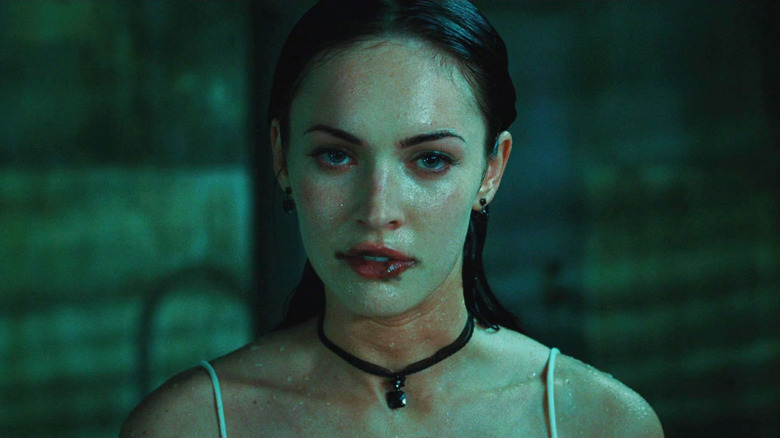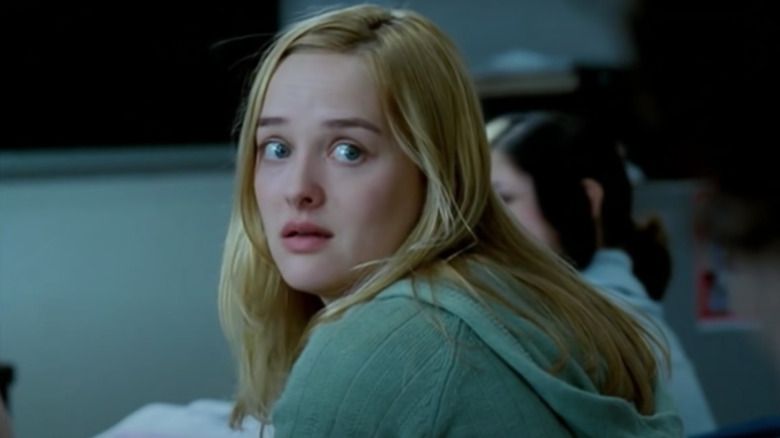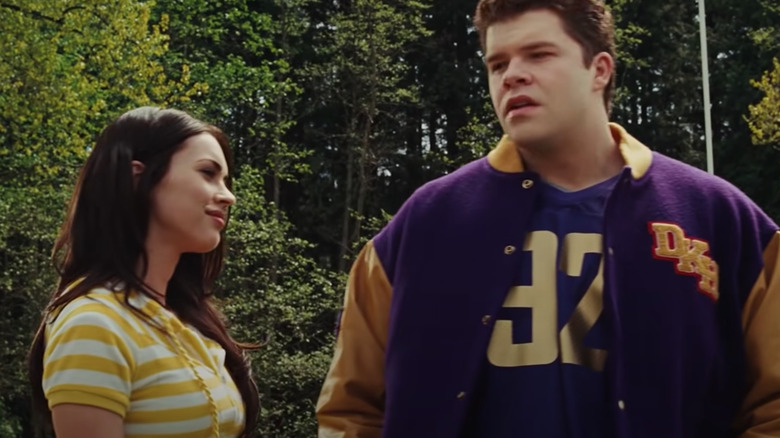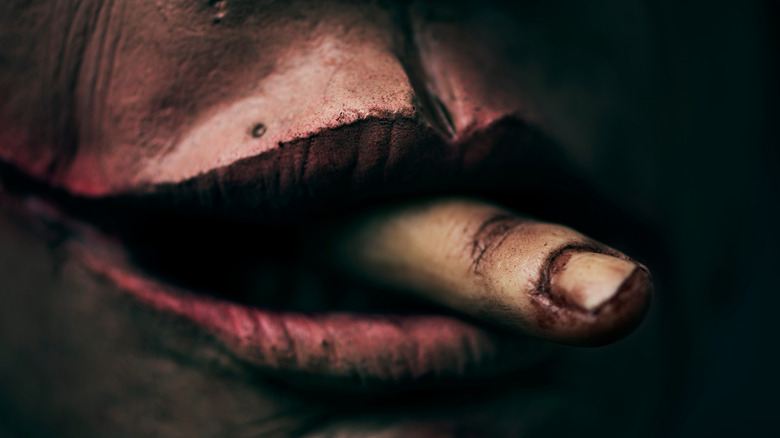I'll Eat You Up: Femme Monsters, Their Origins, And Warranted Rage
Monsters in the horror genre are endlessly nuanced. They can be physically daunting, emotionally horrifying, violent, manipulative, abject, paranormal, and so on. But a consistent thread is that they all start from somewhere. Now, we may not have the luxury of being granted a fully fleshed-out backstory for every monstrous creature, villain, or anti-hero ever to grace the screen, but we can normally chalk their inception up to two scenarios: They're either deeply othered non-human beings, invading the norm and representative of an external threat on society, or there are homegrown, society-made monsters — an amalgamation of humanity's pitfalls, ugliness, and actions that led to a creation that reflecting humanity's misdeeds back to it.
Oftentimes, this perspective can be interpreted as conservative or reactionary, but that doesn't really apply to the "Good for Her" horror subgenre.
Good for her
Feminist horror has been around for a while but has been sliding into "Good for Her" prominence for the past few decades, with examples like "Ms. 45," "A Girl Walks Home Alone At Night," "Under the Skin," "Midsommar," "Ready or Not," and "Pearl" (to name a few). The "Good for Her" subgenre alludes to Lucille Bluth (Jessica Walters) in "Arrested Development," who sees a news segment where a woman came to her wit's end and drove her car into a lake. Bluth peels back the wrappers of her cupcake and boasts a supportive, "Good for her."
While Arrested Development isn't nestled into the horror genre by any means, the overarching theme here is: our femme fatale has been wronged and is exercising rage, pain, and retribution with a vengeance. In the case of the sitcom, the woman drives her car into a lake. In the case of cinema, this rage looks different from film to film; taking the host of a vampire, grieving grad student, or various teen demons.
But it is through that variety that we find a common thread: mankind kinda sucks.
Teeth
In Mitchell Lichtenstein's 2007 film "Teeth," Dawn (Jess Weixler) is your run-of-the-mill American teenager, whose proximity to a nuclear power plant turned her into a living example of the myth of vagina dentata; a vagina with teeth. This deformity gives her the wherewithal to defend herself at the behest of men who aim to sexually take advantage of her.
The movie opens with a panning shot bringing our eyes to the two nuclear plumes fixed in the backdrop of this nondescript American suburbia. In the vein of Michaelangelo Antonioni's "Red Desert," the audience is made keenly aware of the ways in which these industrial monsters disrupt the landscape, and how their presence looms over the well-being of those living in their vicinity.
We're introduced to Dawn and her soon-to-be stepbrother, Brad (John Hensley) as young kids sitting in an inflatable pool, while their respective biological parents, who are courting each other, talk in lounge chairs behind them. Dawn is no more than about 5 years old at the time, Brad about 7 or 8, when he sustains an injury while the two kids are showing each other their genitals; you know, as young kids do. Dawn says nothing during this scene and commits no act of violence that audiences can see. All we know is, the young boy's hand found itself in a place where it shouldn't be, and Dawn's body defended her, biting off the tip of Brad's finger.
We're then reintroduced to Dawn at age 16, who's now preaching abstinence for children and teens in her community. This program also dissuades participants from other forms of intimacy, as well as self-fulfilling pleasure. Knowing that this is presumably a path Dawn has followed since childhood, we can conjecture that she knows as little about her own anatomical anomalies as the audience does. In tandem with a changing body and lack of answers, Dawn's mom is suffering from an unspecified illness — which we can attribute to their home's proximity to the nuclear power plant — preventing her from being able to act as a resource to her maturing daughter.
During sex education, the visual illustrations of vulvas in each student's textbook have been covered up, whereas the guides to more phallic organs are on display to be learned and understood. Between her abstinence pledge, the education system actively obstructing comprehensive sex education, and the impact nuclear pollution had on Dawn's physical body, our protagonist has been forced to wear blinders for her own existence.
Dawn's first sexual interaction with another purity-preaching lemming, Tobey (Hale Appleman), unfortunately, leads to a sexual assault. However, this results in her "monstrous" anatomy coming to her defense, permanently maiming her assailant and stopping the assault in its tracks. Dawn's dreams of marriage, purity, and heteronormative life come crumbling down, dismantling her understanding of herself, her beliefs, and her body. The institutions of chastity and modesty fall away as she realizes that the tenets of Christianity she believed in don't serve her at all; they've actually betrayed her. When Dawn gets home, her stepdad calls out to her offering a plate of dinner, to which Dawn responds, "I ate." Yes, you sure did, Dawn.
The "monster" that lives within Dawn serves to protect her. This monster is both the byproduct and the foil of larger, man-made issues surrounding pollution, violence, industrialization, sexism, and church-based values. She throws her purity ring into the quarry where the assault took place, and we see her step into a newfound power, which is really just a sense of self-understanding. As the story continues, Dawn develops a sense of control and is able to wield her teeth whenever faced with a non-consensual, painful, or displeasing encounter. Essentially, the final line of defense protecting her from man's aggressive advances.
As Dawn continues to gain control of her power, she begins using her body as a means of vindication and justice. After her ailing mother passes, Dawn externalizes her rage by initiating sex with her step-brother, permanently maiming him, and then invites Brad's bloodthirsty dog to consume his lost phallus. The kicker? The dog is named Mother.
Jennifer's Body
In Diablo Cody's 2009 film "Jennifer's Body," Jennifer Check (Megan Fox) carries some heavy queen bee energy before her demonic man-eating transformation. She's a little mean, manipulative, and controlling — as are a lot of teen girls. However, the mean-girl, queen bee persona exists within a vacuum of women trying to tear each other down. While this isn't necessarily the message of the movie, it's pretty counterproductive to pit women against each other. This is also accompanied by sapphic undertones, which are buried by the compulsory heterosexual midwestern teen love stories of the naughty early-aughties.
When Jennifer and friend Needy (Amanda Seyfried) attend Melody Lane — the dive bar where we meet satanic emo band Low Shoulder — a fire breaks out killing dozens, and Jennifer is ushered into Low Shoulder's tour van. Why? Because they think she's a virgin worthy of human sacrifice to bring their band unparalleled success.
When the emo band's sacrifice goes wrong, they're still able to reap the benefits of unbridled success and fame, but their blatant misreading of Jennifer and her sexual expression leads to her becoming a man-eating, blood-thirsty demon. For the most part, she only eats boys. But there's so much more to her than that. In the third act, we find ourselves in Jennifer's room with her getting ready for her school's spring formal, grappling with the reality of her life. In a rare moment of vulnerability, she sheds tears before slathering her face with foundation to cover up her changing, sallow features — signifiers that she needs to feed. Jennifer was a normal teenage girl who reveled in her strong sense of agency. She enjoyed sex, Fall Out Boy, and was an active member of her school's color guard team, and — although toxically imbalanced like a lot of teen friendships — her toxic nature didn't endow her with a thirst for blood. That was the work of Nikolai (Adam Brody).
Jennifer was deeply misread and stereotyped by Low Shoulder's frontman, and his misreading changed the course of Jennifer's high school education, her friendship with Needy, her lust for life, and her ability to continue on as a normal teenager, making mistakes and learning from them. By making an assumption and pigeonholing her entire personhood for their own selfish gain, their botched satanic sacrifice inflated Jennifer's rage to a point where she can only logically channel it in one healthy way: eating boys. This act of consumption serves as a retroactive form of protection. Protection from men's sexual desire, enacting rage and violence to satisfy a curse laid on her by power-hungry a-holes.
We're given a taste of how Jennifer and Needy's power dynamic has been since childhood during a brief flashback of the two of them as young girls playing in a sandbox. Jennifer is essentially in charge, and while Needy doesn't necessarily want what Jennifer wants, she loves her, wants to keep her safe, and values their relationship above everything else. This is evidenced by Needy kissing and sucking the blood off of Jennifer's hand in that very sandbox after she sustains a small cut on her palm.
As Jennifer continues to sink into her demonic man-eating persona, she's drawn to those marked by Needy's approval. Classmates that she's fond of, such as Ahmet the exchange student, creative writing goth Colin Gray, and even her boyfriend, Chip. Remembering that Needy and Jennifer are bound by that bloody sandbox incident, Needy can physically feel Jennifer's energy when she's acting extremely, be it murdering Colin or kissing Chip.
On consumption
When we think about the concept of violence, sexual trauma, or aggression, a common denominator is that these acts involve an invasion of space. Physical space, mental space, bodily space. Pain and fear intrude on one's personal state, as they are unwelcoming feelings often brought on by somebody else or external circumstances. Taking into consideration Isaac Newton's third law of motion, where every action elicits an equal and opposite reaction, it makes sense that, to counteract feelings of invasion, an equal opposite reaction would be consumption; the final form of self-preservation for characters like Dawn and Jennifer.
You want to rape me? I'll rip your penis off. You want to stab me? I'll eat your organs like pasta bolognese and drink your blood like chianti.
There's a satisfying vindication that accompanies a "Good for Her" monster. Her actions don't exist in a vacuum. She doesn't act out of pure aggression, nor does she invoke pain and suffering onto just anyone. This selective consumption is a therapeutic method of regaining a bit of autonomy, exercising some literal (or figurative) demons, and serving up a plate of justice that would often just be overlooked by the U.S. criminal justice system. So let's hear it for the man-eating monsters, the true vigilantes of the horror world.



